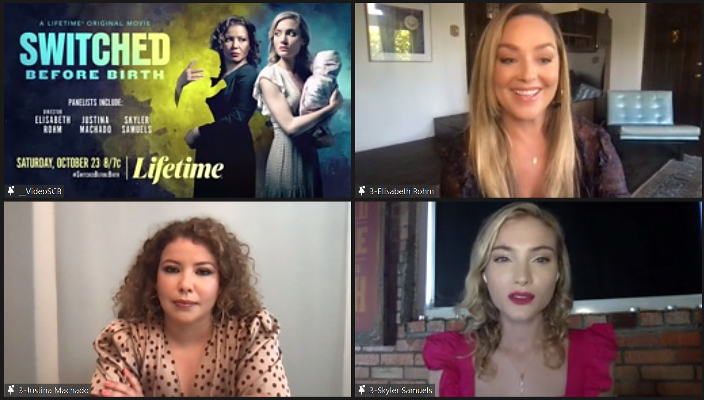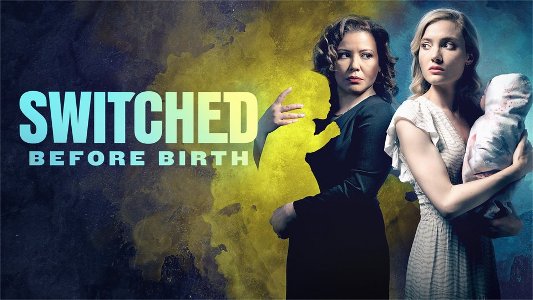TV Interview!

Interview with Elisabeth Röhm, Justina Machado and Skyler Samuels of “Switched Before Birth” on Lifetime by Suzanne 9/14/21
This was from Lifetime’s “Fall Press Panel” last month. It was great to speak with these amazing actresses and directors. I’m a huge fan of Elisabeth, not only from “One Life to Live,” but also from “Angel” and “Law and Order,” among many other movies and shows. She directed this movie rather than appearing in it. It’s her second time directing. She seems to really enjoy it. It’s a good movie, which Machado and Samuels star in, so make sure you check it out 10/23 on Lifetime.
MODERATOR: Our next panel for today is “Switched Before Birth” starring Justina Machado and Skyler Samuels and directed by Elisabeth Rohm. Hi, ladies. Thank you all for being here. Our first question is from Suzanne.
QUESTION: My question is for Elisabeth. I remember you on “One Life to Live” by the way, so. I’ve been watching you a long time.
ELISABETH ROHM: That definitely dates me by a couple of decades.
QUESTION: Aww… So how often does this sort of thing happen, the IVF switching thing that they show in the movie?
ELISABETH ROHM: Well, you know, statistically speaking 15% of couples will struggle with getting pregnant naturally. I was one of those and you know, look, it’s a not-regulated industry, federally regulated industry, so it’s hard to say percentage-wise what kind of mishap, how many times a mishap like this will happen, but you know it’s frequent enough that we really hope that this film makes you take a good, long hard look at the fertility industry.
QUESTION: And as a follow up, do you prefer directing over acting or do you like both?
ELISABETH ROHM: Well, if I get to act with women like this, I want to be acting. No. But directing, listen I feel really privileged that Lifetime has the Broader Focus program and Tanya Lopez created this opportunity for me to pivot in my life and career. And I really love directing, especially when you get to direct a friend like Justina Machado who I starred opposite and just, you know, Skyler Samuels and all the actors in it. So, I have a big place in my heart for directing right now.
QUESTION: Thank you.
MODERATOR: Thank you. Our next question is from Jay Bobbin.
QUESTION: Thank you. Elisabeth, my question is for you, too. You have taken some very big and emotional swings with your directing so far, “Girl in the Basement.” I remember the last one of these you talked about how emotional it was to work with the actors on that. For your second project, were you looking for something as emotional in a different way or would you have been satisfied with something like “Psycho Intern” which is also in the Lifetime can?
ELISABETH ROHM: Well, to be honest I probably would have accepted any job from Lifetime. I have a deep gratitude to the network and I’m excited about developing other projects with them. Justina and I have some exciting things that we’re working on together. But I felt very privileged to be given the opportunity to direct something about IVF because I really went through my own journey, and it was painful and difficult. And these actresses really captured what is deeply personal to me and it’s like lightning in a bottle to watch these two act in this movie, so I was lucky I got a good second swing.
QUESTION: As a follow up, knowing the subject as you did personally and also having gone through the prep for the first film, did you find it — I’m using the word “easier” hesitatingly, because I’m sure subject-wise it’s not necessarily easier. Did you find it a smoother process this time around directing for the second time?
ELISABETH ROHM: Maybe ignorance is bliss. I think the first time was a little bit easier. The second time you know all the things that are required in a different way. But I think it was easier because I had actresses that were my friends playing the lead roles and I felt really supported by them to just thrive and succeed. And it really does take a village. And, you know, I have the utmost respect for these two. So, I would say — I guess I would say it’s easier. It’s just I knew the stakes were high.
QUESTION: Thanks very much.
MODERATOR: Thanks, Jay. Our next question is from Jamie Steinberg.
QUESTION: For Justina and Skyler, what kind of research did you do on this kind of surrogacy and the pain, both of — on both sides of the women’s viewpoints?
JUSTINA MACHADO: I can’t see anybody. I never know. I guess I’ll go first. You know, we all know people — we all know women. I mean, I certainly know women who have struggled with fertility, who have had to go through these cycles to try to get pregnant and the ups and the downs and all of that that comes with wanting a family. You know, it’s a very, very human story which is why I was so attracted to it. But also, I think the second part of your question was how our characters — was that the second part of your question?
QUESTION: Yes, the pain that a woman on either side feels in this situation.
JUSTINA MACHADO: Right. And that’s what’s so beautiful about this movie because you really get those two points of views. I mean, no one is wrong here. No one is wrong in the movie. You know, Olivia’s character is — this is what she feels, she carried this baby. My character is like this is my egg. So, no one is wrong, but we’re both so passionate, both those characters are passionate about their point of view. I was all for Anna’s point of view. I truly believe that if that were to happen to me that would be my point of view. I want my baby. So the beauty of this is you get to see two very valid points of views.
SKYLER SAMUELS: Yeah, I completely agree with what Justina said. There is no right or wrong. It is complicated and messy. I watched it. I still don’t know, and I pray to God I’m never put in a position where I would have to choose that. But you know like Elisabeth was saying, IVF mishaps happen far too often. It’s not regulated. And the fact that anybody could be put in that position is unthinkable. And as far as research for the role, interestingly enough, I have a couple of close girlfriends who throughout 2020 had been going through some real fertility struggles. And in the pandemic of it all, you know, I think that was another tier of isolation. You know, being in a pandemic is isolating. Fertility struggles are isolating. Put those together, and it’s a really, really challenging time. And you know getting to sort of be on that journey with them trying to be supportive and trying to understand how they feel both physically and emotionally and the fact that there are things that women who go through this process can’t explain to their husbands or their partners. Like as much as they want them to know there’s something that’s happening in you that’s just so raw and confusing and complicated that it can be hard. And there was a really beautiful thing which happened which was on our first day of filming. I’m in my sort of funny pregnancy, you know, my fake pregnancy belly. And I had sent a picture to my best friend being like, you know, look who’s got the belly. And she sent me a picture with a positive pregnancy test. So, my girlfriend who had been struggling all year and had gone through this process, I found out that she got pregnant the day we started this movie. So that kind of felt like my good luck charm going into this.
QUESTION: And then you had to start bawling and ruin the scene.
SKYLER SAMUELS: Well, yes. I do a lot of bawling. This is true. Skyler cries a lot in this movie. And while I’m, you know, not a mother myself, I hope one day. I’m very familiar with what grief feels like and with loss. And I think that that is universal to all of us. So, though this movie is about motherhood, I think more than anything it’s about a sense of belonging and a sense of grief and how to sort of live with loss that you just — you can’t make sense of. And I think that’s something that everybody can relate to.
MODERATOR: Thank you. Our next question is from Steve Gidlow.
QUESTION: Hey, my question is for Justina and for Skyler. I’m just wondering what it like is being directed by somebody who has acted as opposed to someone who’s just a technically trained director. And how different is it again, on top of that having a friend direct you on the project?
JUSTINA MACHADO: I always — I don’t necessarily think you have to be an actor to be a great director, you know. But I do think that that’s a big plus. And there’s just things that they understand, actors-turned-directors. I feel like there’s an understanding with how to deal with different personalities on set — how to speak to people on set because they know how they like to be spoken to. They know how they like to be dealt with. And like the little kookiness that sometimes we as actors can have that they will understand and not think it’s a different kind of behavior. That always helps because somebody has been there. And then when you’re working with a friend, it’s just even more — you’re even more free and more vulnerable. I felt I could be freer and not be judged by certain things that I thought or was thinking, or nothing was a dumb question, or nothing was something that that they didn’t have time for. And Elisabeth and I are dear friends. I mean, we met doing “Family Pictures” a couple years ago for Lifetime. So just being able to work with somebody that I already have such a great rapport with, just made work a lot easier and fun as much as we had to cry.
ELISABETH ROHM: I was going to say.
JUSTINA MACHADO: And we got to feel like this. It was fun.
ELISABETH ROHM: No more crying. You did it perfectly. Now it’s done.
JUSTINA MACHADO: So that was my experience.
SKYLER SAMUELS: Yeah. I think there’s always a benefit having someone direct you who’s been in your shoes. But I think there’s actors-turned-directors, actors who are friends and there’s Elisabeth Rohm. Elisabeth is my biggest girl crush of all time. She knows this. I announce it wildly to the world. I met her over Zoom last year and I got off the call and I said to my reps, “Yeah, so I want to grow up to be her, so let’s figure out how we can be best friends” because I absolutely adore this woman and what she’s done. And how absolutely poised and creative and intelligent and thoughtful she is in everything that she does. No question this was some of the hardest work I think I’ve done in my career to date. This is the closest character I’ve played to myself which is a lot more challenging than I anticipated. And I don’t think I could have done the work that I did without Elisabeth. She gave me permission to take up space and be free in a way that no one has before, and it’s been a gift moving forward. I don’t know that how I feel about my job and my abilities would be the same without Elisabeth. She’s just — I don’t know she’s my acting guardian angel always. She’s a magical person.
ELISABETH ROHM: I love you guys. I think I’m going to —
QUESTION: Your turn to cry now.
SKYLER SAMUELS: I can’t help but cry.
QUESTION: Thank you so much.
ELISABETH ROHM: And so really, it’s a love story between these two, you know? That’s really — outside of it being like a film that’s also — Lifetime’s so good at making not just movies, but movements. This is a movement in a sense, but it’s really a love story between friends. So, the friendship between them is really felt and like they both said, navigating grief and finding each other through it all. So thanks, thanks for that, you guys.
QUESTION: Thank you so much.
MODERATOR: Thanks, Steve. Our next question is from Jamie Ruby.
QUESTION: Hi, guys. Thanks for talking to us. Skyler, you started to say how like playing something more towards yourself was more difficult. Can you kind of talk like expand on that? What was it that you found difficult about bringing that?
SKYLER SAMUELS: Yeah, I mean you know I’ve been very lucky that I’ve worked for many years and gotten to play many parts, you know, a lot of which have been you know sort of like supernatural or superhero and I’m kicking ass and doing all kinds of fun things. And I’ve loved those parts. They’re wonderful. But I think there’s something that when you prepare as an actor to play a role that feels like you, when I read the script, there are things that Olivia Crawford says that I’m like, “Oh god, that’s like straight out of my mouth.” Or just like the way that she moves through space, it felt like me. And I think what was both challenging and liberating about that experience was that I had to work through my own grief in real time doing this movie. That there is no barrier between sort of — the barrier between Olivia Crawford and Skyler Samuels was like paper thin. And I’m not used to being that close to the character. And I think that it made — everything emotional that happens in the movie is as real as can be. I had to really be okay with bringing my own real-life grief and experience and struggles and triumphs and just sort of putting it all out there in a way that I haven’t had to do before. And like I just said, I couldn’t have done that without the guidance, love and support of Elisabeth Rohm and Justina. What a partner to just like let you do your thing because it’s challenging. But it’s also really liberating to be able to do that. It sort of sets a part of you free. That’s the best way I can describe it.
QUESTION: Thank you so much.
MODERATOR: Thank you. We have time for one more question and that’s going to be Jay Bobbin.
QUESTION: Thank you. Justina, this is for you. You’ve been at this career a long time. And sometimes it takes that one galvanizing thing like “One Day at a Time” where things really break open and opportunities like this come your way. Is it safe to assume this is an especially sweet time for you now?
JUSTINA MACHADO: You know, it’s so bizarre because it’s so not a sweet time in the world with everything that’s happening. But it’s kind of been, you know, I’ve been okay. And I’m grateful. I’m grateful for that. And you’re absolutely right, I’ve been at it a long time. So, I’m grateful to still be here, still at it. And “One Day at a Time” did open this whole new world to me, for me. And it feels good. It feels really good to be in a place where you’re not just the person behind the camera, that people really — I mean, in front of the camera. People really want to know your opinion, you know. It’s valued what you have to say. It’s more of — it’s the most I’ve ever collaborated in my life in my career, this time in my career. So, it’s been wonderful. And these movies — this movie that we did, Elisabeth and Skyler and I, and then Elisabeth was talking about the fact that we’re also working on some other things — it’s been liberating, exciting. And yes, I’m happy because I’m getting old — so I’m happy.
ELISABETH ROHM: And everybody’s who loves you is dying for you to direct. That’s what’s going to happen next.
JUSTINA MACHADO: Exactly. I want to move to that, too. I want to direct. I want to do all these things. Yes, that’s how I feel so yes. It feels very good, Jay. Thank you, it feels good.
QUESTION: Thank you very much. Thank you.
MODERATOR: A big thank you to all our panelists. Ladies, we really appreciate you taking the time to be with us today.
ELISABETH ROHM: Thank you.
JUSTINA MACHADO: Thank you.
SKYLER SAMUELS: Thank you, guys.
MORE INFO:
Switched Before Birth
Premieres October 23 at 8/7c
Switched Before Birth follows Olivia Crawford (Skyler Samuels) and her husband Brian (Bo Yokely), who after multiple miscarriages, numerous failed IVF trials and stretching themselves to the limit financially, finally receive the joyous news that she’s pregnant with twins. While going through her latest round of IVF, Oliva meets and becomes fast friends with Anna Ramirez (Justina Machado), who is struggling to have a child after years of focusing on her successful restaurants. When Anna becomes pregnant as well, the ladies celebrate and begin to prepare for their babies. Olivia is also there for Anna when she suffers a devastating miscarriage and struggles to move forward while her marriage to restaurateur Gabe Ramirez (Yancey Arias) crumbles. When Olivia and Brian finally welcome their twins Olivia’s life feels complete, but the happy couple’s world is turned upside down when they discover that not only are the babies not twins, but one of the babies is also biologically Anna and Gabe’s that was implanted into Olivia by mistake. Now pitted against each other, Olivia will do anything to keep the baby that she carried, while Anna will stop at nothing to bring her son home.
Switched Before Birth is produced by Big Dreams Entertainment and Swirl for Lifetime. Leslie Greif, Laurie Pozmantier and Stacy Mandelberg serve as executive producers and Elisabeth Rohm directs a script from Kelly Fullerton. Eric Tomosunas also serves as executive producer and Alex Kerr and Ron Robinson serve as producers.
Proofread and Edited by Brenda
Back to the Primetime Articles and Interviews Page


